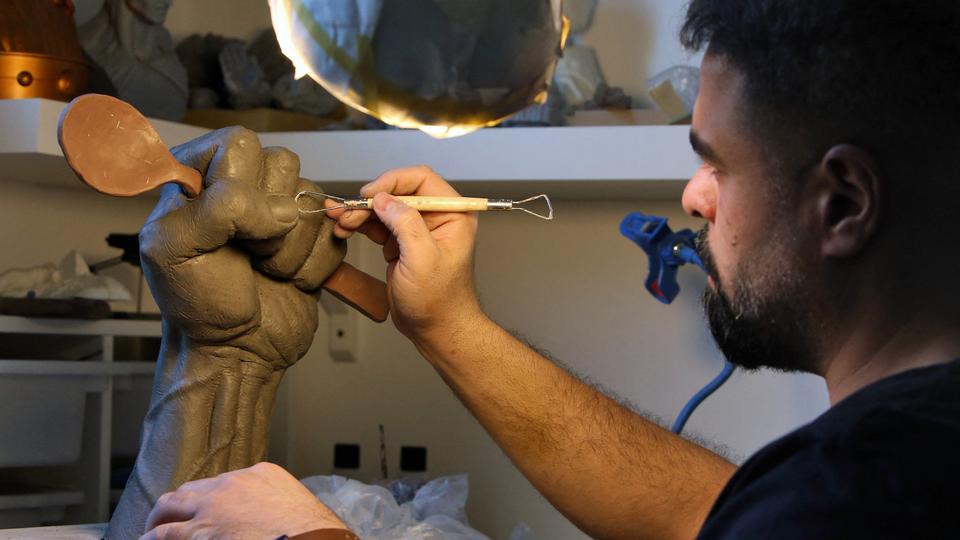Israel recaptures last two Palestinians who escaped from high-security prison

35-year-old Ayham Kamamji and 26-year-old Munadel Infeiat. (Screengrab)
AFP, Jerusalem
Published: 19 September ,2021:
The Israeli army has recaptured the last two Palestinians involved in a spectacular jail break earlier this month, it announced Sunday.
At the beginning of September, six Palestinian inmates escaped Gilboa prison in Israel’s north, through a tunnel dug under a sink in a cell, reportedly using tools including a spoon.
Israel launched a massive manhunt, deploying drones, road checkpoints and pouring troops into the occupied West Bank.
Authorities had already arrested four of the six, and in a tweet on Sunday the Israel Defense Forces said the last two had surrendered “after being surrounded by security forces that acted precisely based on accurate intelligence.”
The men, 35-year-old Ayham Kamamji and 26-year-old Munadel Infeiat, are both members of the extremist group Islamic Jihad.

Israeli police look at a tunnel which Palestinian prisoners used to escape a high-security jail. (Twitter)
They were arrested in a joint operation with counterterrorism forces in Jenin, in the West Bank, the army said in a short statement to the press, adding that they were “currently being interrogated.”
Originally from Kafr Dan, near Jenin, Kamamji was arrested in 2006 and jailed for life for the kidnap and murder of a young Israeli settler, Eliahu Asheri.
Islamic Jihad said Kamamji suffered abdominal and intestinal illness in jail and was subject to “medical negligence” by prison authorities.
Infeiat, arrested last year, had been jailed multiple times previously for his role in the armed group, and was awaiting sentencing at the time of the escape.
The other four men recaptured last week included Mahmoud Abdullah Ardah, the alleged mastermind of the escape, and Zakaria Zubeidi, a former militant leader of the Fatah movement.
Palestinians have a new symbol of resistance — the spoon
Artists from around the region honour Palestinian prisoners who used spoons to dig their way to freedom from an Israeli maximum security prison.

Two men remain on the loose following the extremely rare escape. Israel has begun an inquiry into lapses that led to the embarrassing incident, which Palestinians see as a "victory".
"With determination, vigilance... and cunning, and with a spoon, it was possible to dig a tunnel through which the Palestinians escaped and the enemy was imprisoned," writer Sari Orabi said on the Arabi 21 website.
READ MORE: What the Galboa prison break symbolises for Palestinians
Palestinian cartoonist Mohammed Sabaaneh says the escape has served up "black humour" and exposed Israel's security system to ridicule.
He has made several drawings featuring the utensil, including one titled "The Tunnel of Freedom".
A history made
The issue has also stirred admiration outside the Palestinian territories, where spoons have been carried in demonstrations supporting prisoners detained by Israel.
In Kuwait, the artist Maitham Abdal sculpted a giant hand firmly clasping a spoon — the "spoon of freedom", as he calls it.
Similarly inspired, Amman-based graphic designer Raed al-Qatnani symbolically depicted six silhouettes taking a bridge to freedom, represented by a spoon.
For him, it also evokes the numerous hunger strikes undertaken by Palestinian prisoners to protest their incarceration.
In Tulkarem, a city in the West Bank occupied since 1967 by Israel, the escape brought back memories for Ghassan Mahdawi. He and another prisoner escaped from an Israeli prison in 1996 through a tunnel dug using not kitchen implements but nails.
He had been arrested for belonging to an armed group during the first Palestinian intifada, which lasted until the early 1990s.
"There's nothing prisoners can't do... and there is always a flaw" in the system, said Mahdawi, who was rearrested and then released after a total of 19 years in custody.
In his view, the most recent escapees may have used tools other than spoons, obtained inside the prison, to carry out what every prisoner dreams of but few accomplish.
"To escape from an Israeli prison is something each inmate thinks about," Mahdawi said.
To have done it with a spoon, he added, is something that "will go down in history".
Artists from around the region honour Palestinian prisoners who used spoons to dig their way to freedom from an Israeli maximum security prison.

Kuwaiti artist Maitham Abdal works on a sculpture named "Spoon of Freedom" in his workshop in his home in Kuwait City on September 13, 2021. (AFP)
The humble spoon has taken its place alongside traditional flags and banners as a Palestinian resistance symbol, after prisoners were said to have carried out one of Israel's most spectacular jail breaks with the utensil.
When six Palestinians escaped through a tunnel on September 6 from the high security Gilboa prison, social networks shared images of a tunnel at the foot of a sink, and a hole dug outside.
A hashtag, "the miraculous spoon", suggested how the Hollywood-style feat might have occurred.
The humble spoon has taken its place alongside traditional flags and banners as a Palestinian resistance symbol, after prisoners were said to have carried out one of Israel's most spectacular jail breaks with the utensil.
When six Palestinians escaped through a tunnel on September 6 from the high security Gilboa prison, social networks shared images of a tunnel at the foot of a sink, and a hole dug outside.
A hashtag, "the miraculous spoon", suggested how the Hollywood-style feat might have occurred.
But whether or not the utensil had really been involved or its role was cooked up was at first unclear.
Then on Wednesday a lawyer for one of the fugitives who has since been recaptured told AFP that his client, Mahmud Abdullah Ardah, said he had used spoons, plates and even the handle of a kettle to dig the tunnel from his cell.
He began scraping his way out from the northern Israeli institution in December, the lawyer, Roslan Mahajana, said.
Ardah was one of four fugitives later arrested after the army poured troops into the occupied West Bank as part of a massive manhunt.
All six were accused of plotting or carrying out attacks against Israelis.
Then on Wednesday a lawyer for one of the fugitives who has since been recaptured told AFP that his client, Mahmud Abdullah Ardah, said he had used spoons, plates and even the handle of a kettle to dig the tunnel from his cell.
He began scraping his way out from the northern Israeli institution in December, the lawyer, Roslan Mahajana, said.
Ardah was one of four fugitives later arrested after the army poured troops into the occupied West Bank as part of a massive manhunt.
All six were accused of plotting or carrying out attacks against Israelis.
Two men remain on the loose following the extremely rare escape. Israel has begun an inquiry into lapses that led to the embarrassing incident, which Palestinians see as a "victory".
"With determination, vigilance... and cunning, and with a spoon, it was possible to dig a tunnel through which the Palestinians escaped and the enemy was imprisoned," writer Sari Orabi said on the Arabi 21 website.
READ MORE: What the Galboa prison break symbolises for Palestinians
Palestinian cartoonist Mohammed Sabaaneh says the escape has served up "black humour" and exposed Israel's security system to ridicule.
He has made several drawings featuring the utensil, including one titled "The Tunnel of Freedom".
A history made
The issue has also stirred admiration outside the Palestinian territories, where spoons have been carried in demonstrations supporting prisoners detained by Israel.
In Kuwait, the artist Maitham Abdal sculpted a giant hand firmly clasping a spoon — the "spoon of freedom", as he calls it.
Similarly inspired, Amman-based graphic designer Raed al-Qatnani symbolically depicted six silhouettes taking a bridge to freedom, represented by a spoon.
For him, it also evokes the numerous hunger strikes undertaken by Palestinian prisoners to protest their incarceration.
In Tulkarem, a city in the West Bank occupied since 1967 by Israel, the escape brought back memories for Ghassan Mahdawi. He and another prisoner escaped from an Israeli prison in 1996 through a tunnel dug using not kitchen implements but nails.
He had been arrested for belonging to an armed group during the first Palestinian intifada, which lasted until the early 1990s.
"There's nothing prisoners can't do... and there is always a flaw" in the system, said Mahdawi, who was rearrested and then released after a total of 19 years in custody.
In his view, the most recent escapees may have used tools other than spoons, obtained inside the prison, to carry out what every prisoner dreams of but few accomplish.
"To escape from an Israeli prison is something each inmate thinks about," Mahdawi said.
To have done it with a spoon, he added, is something that "will go down in history".

No comments:
Post a Comment